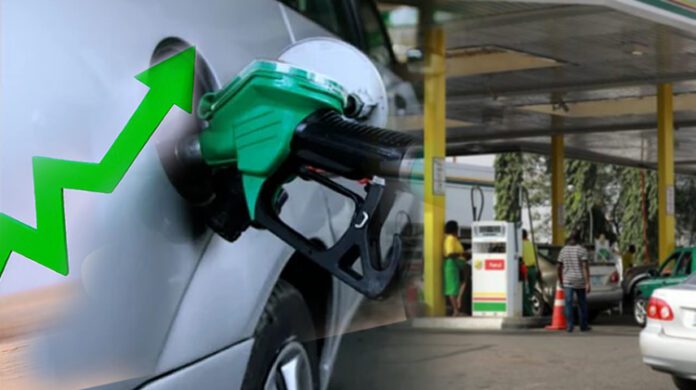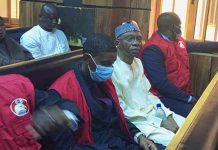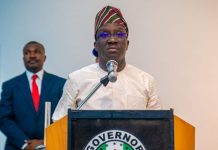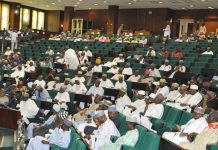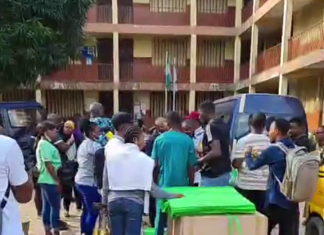On Wednesday, the organised labour protested outside the National Assembly over the deteriorating living conditions there. As a bold declaration of their determination to overcome the odds and make their voices heard, protesters symbolic act of pulling down the gate of the National Assembly complex, writes DIRISU YAKUBU
Their tolerance has run thin, and any hope of relief is far off in the distance. Who, however, could blame them? The least Nigerians can hope for from a new government is that their woes will continue in a nation where life has all but become brutish, nasty, and short.
To tell the truth, Bola Tinubu never asserted during his campaigns that the nation’s woes would end when he was inaugurated as president of Nigeria. Tinubu had made a similar pledge to the presidential candidates of the Peoples Democratic Party and Labour Party, Atiku Abubakar and Peter Obi, that if elected, he would end the subsidy system. With hardly a month under his belt, he fulfilled his promise. So what exactly is causing all this rage across the nation?
Due to the hardship brought on by the removal of fuel subsidies, many Nigerians—regardless of their socioeconomic standing—have taken to travelling unimaginable distances to reduce the cost of commuting to their places of employment. The cost of Premium Motor Spirit, also known as petrol, rose from N534 to N617 per litre over the previous two months, forcing transport within and between cities to increase in price in a geometric fashion. Not to mention how much more expensive food and other necessities have become.
Ineffective in getting the Federal Government to change its mind about completely eliminating the subsidy on petrol, protesters led by the President of the Nigeria Labour Congress, Joe Agaero, and his Trade Union Congress counterpart, Festus Osifo, tore down the National Assembly gate in Abuja on Wednesday after security personnel refused to open the gate so they could interact with the lawmakers.
The nation’s protesters sang and danced in frustration as they urged the government to implement practical palliative measures because they were weary of suffering that showed no signs of ending. As it turned out, the palliatives that the President announced in his Monday broadcast to the country did nothing to soothe the nerves of a frazzled workforce.
Ajaero, who told reporters at the Unity Fountain that “nothing is stopping the protest, not even an overture from the government,” cautioned against just lip-service to the demands of workers, who he claimed have been the biggest losers as a result of the subsidy removal.
He continued by saying that organised labour would not abandon the massive protest unless the government showed a willingness to deal with the issues facing the nation.
Some of them must have felt beyond embarrassed by the invasion of the National Assembly complex on Wednesday during the senators’ screening of ministerial nominees.
Victor Umeh, a senator for Anambra Central Senatorial District, criticised the Tinubu-led administration for not having a sufficient plan in place for what would happen after the subsidy removal. He claimed that the nation’s oil sector had been plagued by the constant reliance on market forces for many years and that the local refinery of crude oil remained the only model that could be relied upon to do so.
The lawmaker also urged the Tinubu administration to think about overhauling the country’s four refineries in the interim rather than relying on imported fuel to meet local demands, even though Umeh agreed that subsidy removal was a positive step and urged Nigerians to have patience with the Federal Government.
The Commander-in-Chief’s palliatives were not exactly what the poor needed “to breathe now,” according to Umeh, who was elected on the Labour Party platform.
“It is very unfortunate that the country is going through a very difficult time,” he said. For us to find a solution, everyone needs to calm down. We are currently experiencing hardship because the sudden removal of the fuel subsidy was not anticipated. If we are unable to locally refine crude, we will not be able to escape this situation. I want to implore Nigerians, including NLC members, to give the government a chance to begin, and the best way to do that is by beginning to refine crude oil locally.
We cannot overcome this difficulty if we continue to rely on the importation of refined goods. I feel for Nigerians, including myself. We cannot deny that Nigerians are suffering. While we work to establish new refineries, let’s restore the operational status of the ones we already have in the nation. Insofar as local transport is concerned, the government should devise measures to mitigate the impact.
“The N8, 000 per family that has been proposed is neither here nor there. The President’s announced palliative packages as a whole should be reviewed because the public’s needs are expanding daily. In actuality, these services should have been offered by the government prior to the subsidy’s removal. There is a problem if a typical worker finds out all of a sudden that his monthly wages cannot cover his transport and food expenses.
Billy Osawaru, a representative for the Orhionmwon/Uhunmwonde Federal Constituency in Edo State, joins the discussion and claims that some influential but unnamed Nigerians are the driving forces behind the widespread protests.
“Some Nigerians are behind the protests because it is clear that the President is ready to respond to the people’s desires; why then, are there protests? The President has appeared to outline strategies for dealing with the difficulty. Never before has it been this good. Telling ourselves the truth will help. President Tinubu, who has only been in office for two months, has catered to public desires. He has developed short-, mid-, and long-term plans to address these issues, but these people insisted on staging a protest despite his efforts. What are they trying to accomplish?
Do they now claim that no one is paying attention to them? At the end of the day, those who are fanning the flame of mistrust don’t have Nigeria’s best interests at heart. If so, they ought to take the President’s suggestions into consideration.
Osawaru recalled how the previous administration did not give organised labour a chance to disagree with its stance on certain issues, saying, “These same labour people were taken to the National Industrial Court by the administration of Muhammadu Buhari and they were banned from protesting.” What success did they have? These protests are being organised by self-centered individuals, which is very regrettable. Nigerians should be well-educated enough to understand that those who claim to love their country are actually doing things that are bad for it.
Senior Nigerian advocate Mike Ozekhome advised the Federal Government to address the hardship being felt by Nigerians and cautioned that things could get out of hand to an unthinkable degree.
The country is constantly on edge due to elite predators and buccaneers who have an insatiable urge to engage in primitive wealth robbery. It will only get worse. If nothing drastic is done to reverse the terrible situation, Nigeria is on tenterhooks and on a precarious curved cliff, the man claimed.
The former national secretary of the Arewa Consultative Forum, Anthony Sani, also spoke and said that while it was okay for the protesters to take to the streets, tearing down the National Assembly’s gate was going too far.
He said: “While I sympathise with the NLC and Nigerians over the hardship brought on by the elimination of fuel subsidies, I do not think that tearing down the gate of the National Assembly is a solution. We were all in favour of fuel subsidies in the past because the government could afford them, but as oil prices have fallen and production quotas have decreased, the government is no longer able to support them and has no choice but to eliminate them. In his broadcast, the president stated that.
The biggest political parties in the nation all pledged to abolish the subsidy regime if they were to win the 2023 presidential election, Sani continued, adding that this was the only reason for this.
This explains why the APC, PDP, and LP, three of the major political parties, actively promoted its removal. The Federal Government has developed palliatives in response to its removal to lessen the hardship being felt by Nigerians. What is required of the NLC, TUC, and other Nigerians is advice on how the government can lessen the hardship currently being felt while waiting for the Dangote Refinery to begin operations and drive down petrol prices.
The opposition parties, the TUC, the NLC, and Nigerians are free to advise the government on how to maximise the use of the country’s finite resources for the common good. Anyone can participate in protests and acts of violence, but they should be avoided. Protests and the destruction of public property are never the answer in this situation, he insisted.
As leaders of the various labour unions were reported to have met with the President a few hours after the protest ended in the majority of state capitals across the country, it is unclear what actions the government would take next.
Join Television Nigerian Whatsapp Now
Join Television Nigerian Facebook Now
Join Television Nigerian Twitter Now
Join Television Nigerian YouTUbe Now

